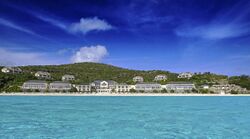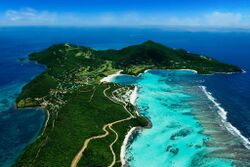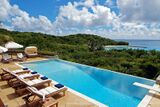Elysia Island
| Nickname: The Island Paradise | |
|---|---|
 Image of Elysia Resort's main buildings | |
 Overhead photograph of Elysia island | |
| Geography | |
| Location | Ionic Islands, Kayamuca sea |
| Area | 7.2 km2 (2.8 sq mi) |
| Administration | |
| Demographics | |
| Population | 582 (2019) Population consists of permanently-housed employees, defined as "Employees who live on the island in either six or twelve month cycles". |
| Languages | Latin |
| Building details | |
| General information | |
| Opening | July 2 2003 |
| Owner | Aurea Group |
| Management | Paradisum Resorts |
| Design and construction | |
| Architect | Pellio Maecius |
| Developer | Aurea Group McDonnel Builders |
| Other information | |
| Number of suites | 100 |
| Number of restaurants | 5 |
Elysia Island is a 725 hectare (1,792-acre) island in the Ionic Islands archipelago, located in the Kayamuca sea. The island is owned and operated by Paradisum resorts as a high-end exclusive resort for the wealthy and the Nobility. The island was first discovered by explorers of the Kayamuca Empire who seldom utilised it, instead opting for more strategically placed islands in the eastern mouth of the Kayamuca Channel separating Belfras and Mutul. This disuse of the island saw it mostly overlooked during the Belfro-Mutulese wars of the 20th century until it was bought by Aurea Group through the subsidiary Paradisum Resorts. The resort, which opened in 2003, has quickly become one of the world's most prestigious holiday destinations, with guests including millionaires and nobility from every continent on a yearly basis.
Resort
In 1993 Aurea Group began a major construction project to convert the island into a resort. During construction, wild-life keepers were brought in to relocate the wild-life temporarily to a reserve on the nearby Tein'walla Island during which they were slowly introduced to humans. The resort was designed by Sir Pellio Maecius and built by Arthuristan-based McDonnell plc. For his work, which won awards for it's beauty, Pellio was made a count.
The resort, named the Paradise Island Resort formally opened in July 2 2003, features 100 private villas. Each villa is of varying size between 1 and 4 bedrooms, features a full kitchen, en-suites and private pool. Private staff for each villa includes a butler and a private chef, along with a masseuse and a large selection of other professional staff available for hire. Private dining on the island can be achieved in the villa, although with prior notice the resort's staff can set up an area anywhere on the island for guests to eat - On their own, with their family, or even as a large group. Five restaurants exist on the island for fine eating as well, featuring world-famous chiefs on a rotating schedule.
Featured at the resort is a spa with 12 treatment pavilions, saunas, jacuzzis, experience showers, and a 24-hour fitness center. The spa also includes a 50-meter long swimming pool and the complex is located next to the Lamaseze Resturaunt in what has become locally known as "The Avenue", a luxuriously paved stone walkway that also features the Praesidium, the largest venue on the island which is constantly being used, as a meeting venue for businesses, a concert hall for guests, a wedding venue, and much more. Featured at the resort are also a number of tennis courts, a soccer field, private access to the island's beaches - including two private cove beaches which are included with both of the largest 10-room villas built on the island.
In 2010 the resort closed for a year while renovations and new constructions were made - renovations had been underway since 2008 and the closure was due to heavy construction occurring within that year. The new constructions featured a revamped private desalination system, relaid ocean power and wifi cables, emergency power systems, two new helipads and a new security center located under the Praesidium. New buildings for guests included a library, a Tsurushimese bathhouse, a new pavilion with a private cinema and a purpose-built nightclub. A new building on the Avenue was inhabited by several high-brand shops and jewelers. Away from the resort, soil was shifted to create a produce garden which can be freely visited and it's fruits and vegetable utilised by guests at will. Finally, a greenhouse was built by the garden which features plants from all over the world, separated into continent-based rooms.
Privacy, security and access
The island is entirely owned by Paradisum Resorts and under Federation law the island in it's entirety is classified as private property. This was expanded in 1991 when Aurea Group the rights to the surrounding waterway, resulting in a privacy barrier to keep paparazzi from encroaching close to the island. The intrusion of private property or the usage of high-zoom lenses to take photographs or video of the property without the written consent of the island owners and the subject of the photograph is deemed a criminal offense[1]
Paradisum Resorts utilises Rook Security for guarding the island and it's waterways. The private security firm also operates an emergency clinic on the island for emergencies and, if needs be, makes use of the island's airstrip to evacuate any injured guests or employees to the Ionic Islands. The Ionic Island Police Force makes weekly visits to the island and is capable of responding to an emergency within three hours, and the Belfrasian Coast Guard includes the island on it's regular far-sight patrol list - Meaning the vessel is in extreme visual range to not disturb the guests but be able to police the area if needs be.
The island's first pier was built in 1985. Since then the island has become home to a small airstrip, helipad, and three docks; Two docks for yacht mooring and one for private boat hire to explore the nearby sandbanks, jet-skiiing, or diving.
Gallery
See also
- Olympia (resort) - Mountain resort owned by Aurea Group and also operated by Paradisum Resorts.
- Rook Security
- ↑ According to rulings made Hershal vs Thessalona Herald 1974 and Crown vs Celeb Times 2012; invasion of privacy includes taking a photograph or video of a person or persons on private property, even if the individual taking said photograph or video is not currently on private property themselves. This is true even if public interest is at hand. Previous instances have seen the guilty party be fined upwards of B$2.5 million and a six month suspended sentence for repeated offenses. This ruling, however, does not interfere when law enforcement can show just cause for taking photographs or video i.e criminal investigation (see Leonid vs FIA 2001)



